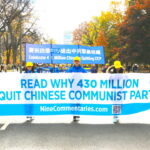For years, organizers in Philadelphia encouraged the formerly incarcerated to vote for criminal justice reforms.
They achieved successes such as the election and reelection of District Attorney Larry Krasner and a package of criminal justice reforms. Despite this, there has been pushback, including Krasner’s impeachment.
This election cycle, organizers are focusing on a new concern and talking point as they engage with communities impacted by mass incarceration: Project 2025.
“Under Project 2025, the Justice Department would be used to undermine and crack down on so-called progressive district attorneys.”
The detailed policy document from the Heritage Foundation has been disavowed by the Trump campaign, but concerns persist in Philadelphia that it could serve as a blueprint for a federal power grab.
“Under Project 2025, the Justice Department would be used to undermine and crack down on so-called progressive district attorneys,” expressed Saleem Holbrook, the executive director of criminal justice advocacy group Straight Ahead. “It was hard enough fighting that battle on the state level. We can only imagine how difficult it would be to fight that battle on the state and federal level.”
Pushback on Project 2025
Debate surrounding the 900-page document has mainly centered on reproductive rights, civil service protections, and Medicaid downsizing.
Project 2025, in addition to advocating for expanding the death penalty, provides a roadmap for criminal justice policies that could impact reform-minded prosecutors like Krasner.
Photo: Sergio Hyland
Alarmingly for prosecutors like Krasner who have exercised their prosecutorial discretion, the document suggests taking legal action against officials who fail to prosecute criminal offenses.
While Holbrook’s group hasn’t endorsed a presidential candidate, Project 2025 remains a key topic during their community outreach efforts.
Sergio Hyland, a Philadelphia native who spent over 20 years in prison before his release in 2022, now works as an organizer with Straight Ahead, engaging with communities impacted by incarceration.
Low Former Incarcerated Turnout
Straight Ahead is part of a national effort to encourage formerly incarcerated individuals to vote, according to Ariel White, an associate professor of political science at MIT.
State laws regarding voting rights for the formerly incarcerated vary widely, with registration and turnout rates remaining lower than the general population in many places.
“The biggest challenge is apathy,” noted Holbrook. “People feel like the system isn’t working for them, not just in this election but every election cycle.”
“The biggest challenge is apathy.”
During door-to-door outreach, discussions about the presidential campaign arise, focusing on community needs and candidate platforms.
Nationally, there is limited data on the voting intentions of formerly incarcerated individuals. A survey by the Marshall Project revealed strong support for Donald Trump among incarcerated individuals.
Polls indicate a decline in support for Kamala Harris among Black and brown men affected by mass incarceration, but Holbrook emphasized the importance of addressing real issues and dispelling misinformation to engage with these communities effectively.
“We don’t sugarcoat that.”
Please rewrite this sentence.
Source link





